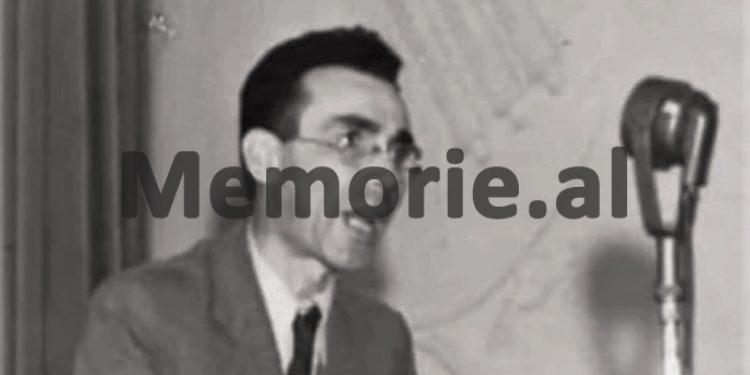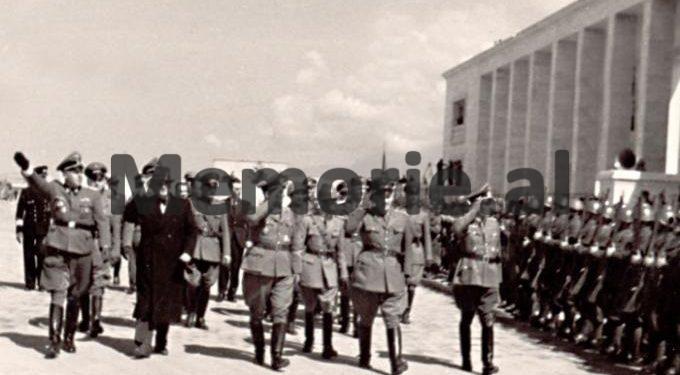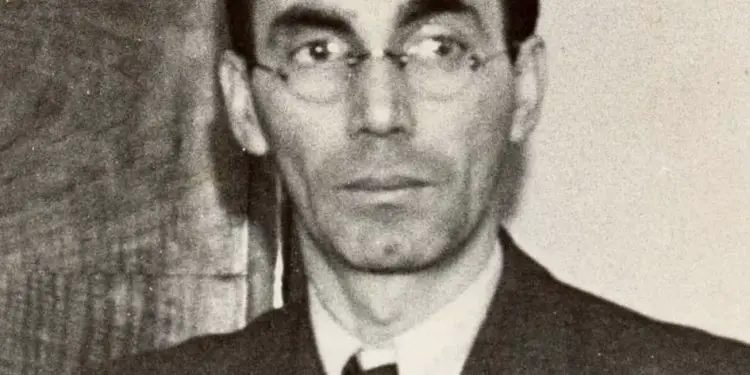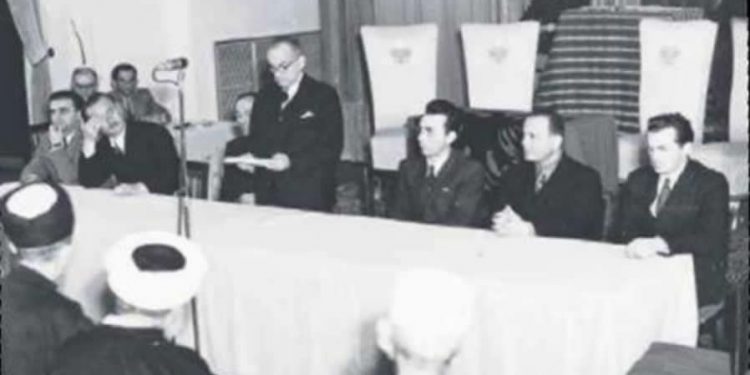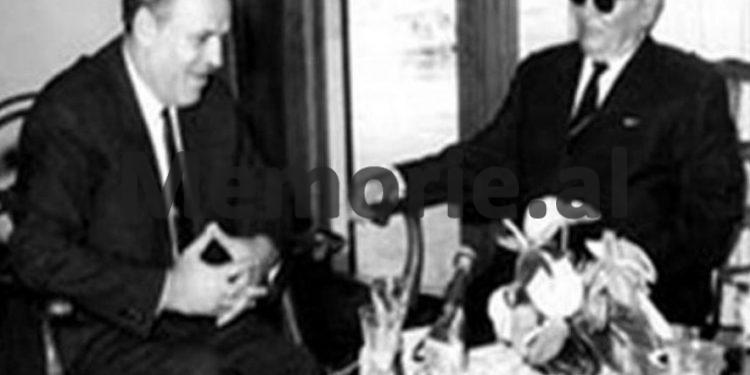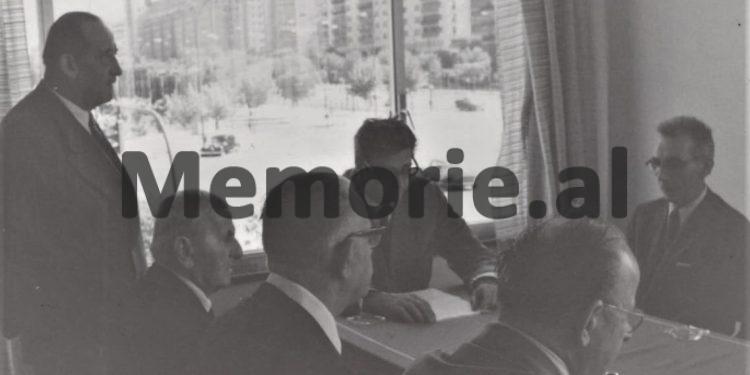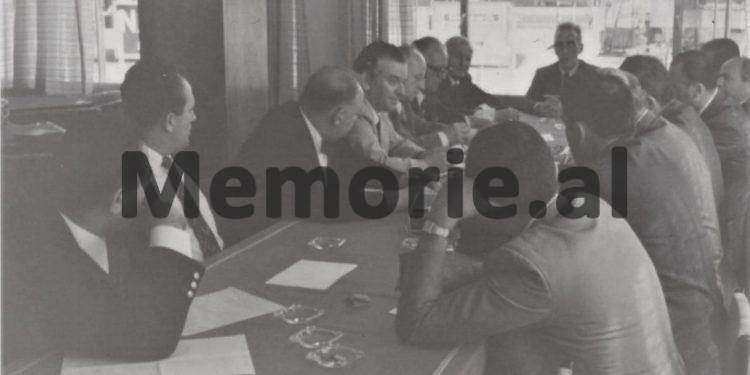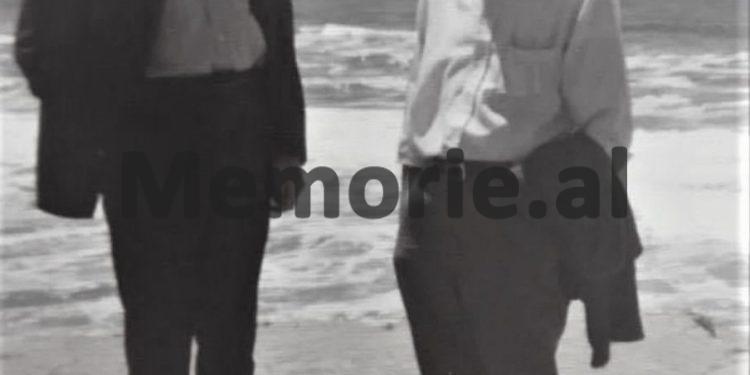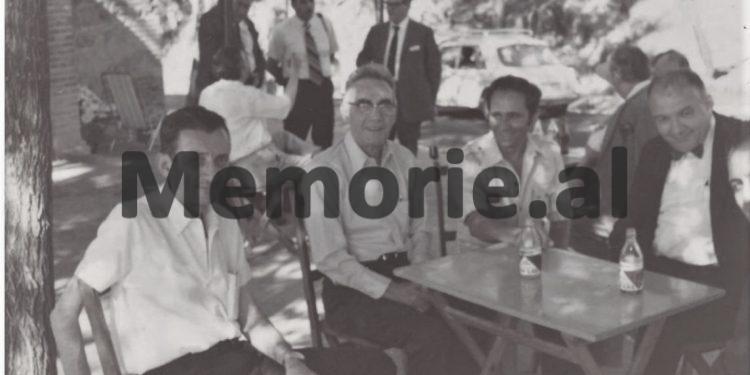By Idriz Lamaj
From the works of the apostles of ethnic Albania
Xhafer Deva
In light of his own letters and other diaspora revelations
Preface
Memorie.al/ Probably like many others, I often browse letters with my friends and associates, who are no longer in this life. Browsing through them, for a moment unfolds memories that it seems to me that some of them can serve our history. Then, I return to the awareness of the current difficult situation in the ethnic homeland, caused by the quadruple of Albanian politics, I say to myself: “What can my memories of others or the letters of the people of dead?”
Without being the ominous instigator of pessimism, thinking as always of a better future, I return to my obligations to my friends, and as an icy observer of time, without any claim of historical service, when I am given the opportunity of publication, write what I have in mind, always based on their writings and letters. This principle is also followed in this book about Xhafer Deva. I knew Xhafer Deva in person; we exchanged visits and had a strong correspondence.
I spent days off at his house and inherited all of Xhafer Deva’s correspondence with Rexhep Krasniqi, his closest friend, for more than 40 years. After many years, I talked on the phone with Mrs. Deva’s daughter and son-in-law. In the conversation going on, taking advantage of the old friendship, I asked about his letters and they informed me that it was all Qefali Hamdia, a friend of their family.
In June of last year (2001) I went to Kenosha, Wisconsin, a guest of Qefali Hamdia, to look at Xhafer Deva’s correspondence, which Mrs. Deva sent her years ago, when she, due to her advanced age, was closed his house to go to the house of his 5th daughter and son-in-law, Mrs. Burgl Dagmar and Rev. Dennis Logie.
After reading the bulk of the letters, in the languages I knew, I took with me more than a thousand pages of his correspondence, covering a period of over 30 years, 1945 – 1978. Xhafer Deva spoke and wrote seven – eight languages. His correspondence is: Albanian, English, German, Italian, French, Turkish and Serbian. Xhafer Deva’s letters and writings, with the exception of those in Old Turkish and Serbian in Cyrillic, are mostly typewritten, well-kept, and alphabetically arranged, with the persons he dealt with.
That includes his family letters. He carefully kept a copy of every letter he sent and every letter he received. Mrs. Oswalda Deva, daughter Burgl, son-in-law Dennis Logie and Mr. Qefali Hamdia with family, expressed his heartfelt thanks for the trust they gave me. With special gratitude I recall here the help given to me by my brothers – Captain Nue Gjomarkaj and Nikoll Gjomarkaj, in the preparation of one of the most important chapters of this book.
Kapidan Nou, in addition to making available the subject on Xhafer Deva’s relations with the ‘Independent National Bloc’ and sending paratroopers to Albania and Kosovo, reviewed with me each document of that period, and we formulated the text in the form of a conversation; while Nicholas, deciphered the letters, transcribed and translated from Italian, the unpublished materials to date, which were published in this chapter.
Xhafer Deva’s life and activity in exile
– Kosovo in the time of ethnic Albania –
What Kosovo did not see and what it did not experience before and after the two World Wars under the savage captivity of the monarchist and communist regimes of Yugoslavia: my thousands of families of emigrants with nothing left in their souls, to leave their homeland by force of them, never to return to it; thousands of young boys and men of old age, stuck in arms, to endure despair to legendary heroism, only to remain with Albania; thousands of others, to die in the dark cells of prisons, like that of Stara Gradikka, Mitrovica of Srem, Idrizovo of Skopje, Goli Otok and Nis, etc., etc., like these; my mother, Albanian sisters and women left behind in the polls, covered in eternal mourning, raised orphaned children in their arms.
Well, all that blood and those tears were not shed for personal purposes, nor for rewards, nor to take a bullet of land or inherit the foreigner, but only to save two fingers and a fist and inherit from the fog of the narrator. The Albanian population of Kosovo, Macedonia and Montenegro, which has always been faithful to the death of the ethnic homeland, and which has set glorious examples in our national history, has never and in no period been more proud of it confident in the unification of the nation than during the stormy years of the Second World War, a period that that population called the “Time of Albania”. Without seeing the occupation of the German and Italian armies at all, she recognized that time as the time of unification with Albania as a state, both spiritually and physically.
This expression of definition is in complete contradiction with the expression “Greater Albania”, which Belgrade propaganda, whether nationalist, communist or socialist, uses in the sense of Albanian imperialist expansion, yesterday at the expense of Yugoslavia, and today at the expense of Serbia, Montenegro and Macedonia. The man of the ethnic Albanian state, who on behalf of that people played the most decisive role in the “Time of Albania”, is undoubtedly Xhafer Deva. Let us now see under what circumstances he and his comrades said goodbye to Kosovo and what role he and the ‘Kosovo Group’ played in exile. This group, led by Xhafer Deva, left Prizren, the symbolic capital of ethnic Albania, in the middle of 1944.
Before leaving, the Central Office of the Second League of Prizren was handed over in the most orderly and honest manner. The leaders of this League, who had the government to lead the war, as well as the administration of Kosovo through the heat of the war, gave a special importance to the handing over of the financial situation, which was quite considerable. The handing over of the untouchable treasure, which was found in the coffers of the League, is the most typical example of Kosovar manhood and the full proof of the high morals of Xhafer Deva and his collaborators. The truth is that even Slavo-communist enemies, to this day, have not been able to open their mouths against them for moral abuse or personal gain.
On the evening of November 17, 1944, two days after leaving Prizren, through the roar of bombing and raging attacks on the city of Pristina, where the roads were reduced to rubble and almost all the lines connecting the city with the suburbs were destroyed or cut off. , The ‘Kosovo Group’, consisting of Rexhep Mitrovica, Rexhep Krasniqi, Tahir Zajmi and Xhelal Mitrovica, Xhafer Deva secured the retreat to Kraljevo. However, they could not leave until the late hours of that stormy night of rain and war because Rexhep Mitrovica was absent. It was the unwavering loyalty of his comrades and a kind of miracle that Rexhep Mitrovica escaped without being killed or taken prisoner by the partisans. Finally, with Xhafer Deva’s personal car, they reached the point where the plane would take them to Zagreb.
The President of Croatia, Ante Paveli,, together with the Foreign Minister, who was a Bosniak, a friend of the Albanians, welcomed him and encouraged him. In Zagreb, this group, led by Xhafer Deva, commemorated with honors the Croatian government, our national holiday, 28 Nandorin, and stayed in Croatia for two weeks. At the beginning of December of that year, the five-member Kosovar Group crossed the Slovenian-Austrian Alps with great difficulty, which was covered with snow up to the belt. The harsh north and the frostbite allowed them to see each other. Fifth, with only a pair of Deva-shaped clothes and a bag of dry food on the back of a revolver in their belt, they crossed the Alps and took refuge for a few days with a friend of Deva.
From there they entered Vienna to meet with the Western allies, in the area of control of which western Austria had fallen, turned into ruins and into a chaotic state, where crowds of expatriates stripped and exhausted from the war and fled, wandered everywhere to avoid the communist lava that was burning everywhere. Insecurity and hunger reigned everywhere. There, too, the friend was afraid to reach out to the friend. Eastern European statesmen lingered for a piece of bread and trembled in astonished corners to watch the Allies’ dying stance on the Russian lobby, which was setting the border in the heart of Europe.
The ‘Kosovar group’, thanks to Xhafer Deva’s personal friends, settled in Vienna, where he secured his life as a refugee and served the settlement of Albanian nationalist groups, who arrived there through indescribable difficulties. The groups of ‘Balli Kombëtar’, the group of Mirdita with Kapidan Gjon Marka Gjoni at the head, Nuredin Bey Vlora, Shefqet Verlac, Mehdi Frashëri with family, Kol Bib Mirakë and many others, Xhafer Deva provided temporary shelter and rescue from the fury of the Red Army that had arrived on the threshold of Vienna. The Kosovar Group’s apartment became an official center in the service of all Albanian emigrants, including many students who worked there.
In particular, Xhafer Deva took care of Rexhep Mitrovica, who was in poor health and who, through personal friends, provided him with accommodation in a Sanatorium, in a district of Feldkirch near the border with Switzerland. At the end of 1945 and until the beginning of 1947, Xhafer Deva withdrew to some of his friends in western Austria, from where he remained in constant contact with the comrades of the ‘Kosovo Group’ and tried to get news and establish connections with the anti-communist resistance in Kosovo, but the news he received was shocking: during those two years, the Tito regime had established military dictatorships in Kosovo, Montenegro and Macedonia, where thousands of Albanians had ended up under the barrage of firing squads and through prisons.
The news of the end of the Drenica uprising under the leadership of Shaban Polluzha, Mehmet Gradica and Ymer Berisha, followed with selflessness by the popular mass of that district that left more than 5000 people on the battlefield and the scribbled writing of 44 villages, shocked him greatly. Kosovar group. The hope and promise that the allies could land in the Balkans, if there were such uprisings of organized nationalist resistance in neuralgic countries, such as Kosovo, began to fade, not to say it was extinguished. At present, there were only separate detachments in Kosovo in constant pursuit, such as that of Ymer Berisha, Adem Agë Rashkoci, Ali Morina, Xhem Gostivar in Macedonia, etc.
Most of these Kosovar leaders were engulfed in the raging pursuits of the Yugoslav Security Forces during 1946 and 1947. Those who survived crossed the border into Greece. However, Xhafer Deva could not remain neutral and suspended. In 1947, he moved to Italy, where he met with Xhelal Mitrovica, Tahir Zajmi, Ali Draga and withdrew Rexhep Mitrovica from Austria, improving his health and Rexhep Krasniqi. Together they went to Genoa, Italy, where with the help of a Turkish diplomat, who was an Albanian from Prizren and a personal friend of Xhafer Deva, they secured Rexhep Mitrovica’s permission to go to Turkey.
They did the same with Dr. Nuri Dinon with his family, another well-known patriot of the martyred Chameria. At the end of 1947, Xhafer Deva, Rexhep Krasniqi, Xhelal Mitrovica and Tahir Zajmi emigrated to Syria, where they resumed their political activity with the publication of the newspaper “Bashkimi i Kombit”, one of the first 12 newspapers of Albanian nationalism, after war. Xhafer Deva stayed in Syria for four months and suddenly returned to Rome. During his stay in Damascus, he met many Kosovars who settled there some time ago, who had come to Syria from Turkey, at different times. Many of them remembered the legends of their ancestors about the superhuman suffering during the violent expulsion from Kosovo.
Despite Xhafer Deva’s departure from Syria, his comrades continued their political activity by publishing newspapers. The Kosovar group started publishing the newspaper “Bashkimi i Kombit” with the editor Xhelal Mitrovica, a prominent journalist and disciple of Gjergj Bubani. the clarity of thoughts of ‘Brithyesi’ (pseudonym of Xhelal Mitrovica – I.L.), Rexhep Krasniqi, Tahir Zajmi, etc., studies, rich historical-political analysis, neutrality regarding Albanian political groups in Exile, the serious struggle against communism and the determined defense of the silent voice of the Albanian people in their homeland and under Yugoslavia, make this newspaper worthy of the title it held and desired by scholars of ethnic issues.
From “Bashkimi i Kombit” (June 29, 1949) we learn that the ‘Kosovar Group’ had in time given the mandate to Xhafer Deva, to represent him in the political talks of that time, when hopes for a general uprising had begun to rise, in which undoubtedly our diaspora would play a prominent role in the external defense of the insurgents. The years 1948 – 1949, for Xhafer Deva, are a period of hard work and uninterrupted movements. At a time when for many emigrants there were more words than work, Xhafer Deva tries to represent Kosovo within the body of the National Committee “Free Albania”, which was being established, with other areas captured under Yugoslavia, regardless of which would be representative.
Although he had nothing to do with English intelligence, he directly influenced the issue of ethnic Albania not to be separated from the problem of the truncated Albanian state. On the other hand, when King Zog summoned to Alexandria, Egypt, the most important representatives of the Albanian parties, Xhafer Deva was elected Speaker of the Assembly of Alexandria. The honor bestowed on Xhafer Deva in that Assembly is reflected in the “Union of the Nation” (June 29, 1949): “Xhafer Deva has only a lofty and reasonable goal of forming bases in Kosovo and Albania, which has successfully completed, after today we have relations with Kosovo. ‘Kosovar Group’ is represented by Xhafer Deva, considers his representative as a valuable, dynamic and capable element in the field of preparation of the action strategy. ‘Kosovar Group’ will continue the publication of “Bashkimi i Kombit” and will try to act in a broad style and with more complementary means. ” Kosovar Group ‘believes that it has interpreted not only the Kosovar popular directives, but also the wishes of the Albanian people “.
Xhafer Deva made a strong contribution to the preparation and establishment of resistance centers in the mountains of Albania, especially in relation to the northern groups, which made bloody efforts and sacrificed themselves for them to see a free and united Albania within ethnic borders. The establishment of radio centers in Albania and in the outside world lasted until mid-1953, when the West gave up its activity for the liberation of Albania from the system and the savage communist dictatorship. For more than eight years, 1944 – 1953, the anti-communist resistance in the mountains of Albania and at the same time in ethnic Albania, remained alive and unyielding, faithful to the simple Albanian ideals against the communist regimes of Tirana and Belgrade.
During all these years, Xhafer Deva, going through the dangers of his life, turned to God and helped him wholeheartedly to raise the national movement in actions, to liberate Kosovo from Slavic hooves and Albania from the servants of the enemies of nation. In 1954, Deva started working in a Polish refugee office, from where she again helped from all sides and enabled the emigration of Albanian refugees to Canada, America, Australia, etc., who had long remained in the camps of Italy and Greece. Memorie.al




